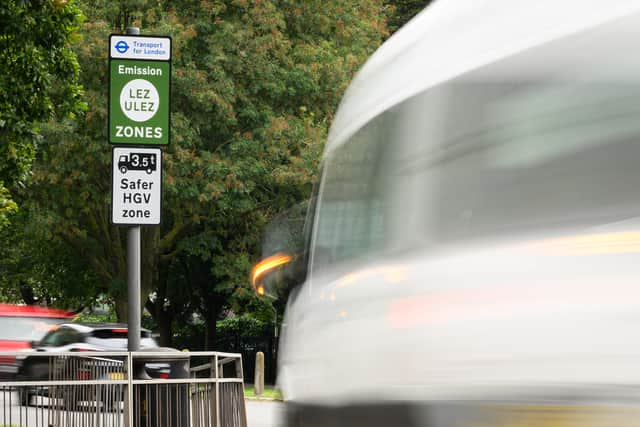ULEZ: Think tank warns drivers may take longer routes to avoid charge
and live on Freeview channel 276
A London think tank chief has warned the Ultra Low Emission Zone (ULEZ) may be forcing some drivers into taking longer routes to avoid paying the charge, amid calls for a smarter road user charging system.
London mayor Sadiq Khan expanded the ULEZ from inner and central London to cover the whole of the capital on August 29, making it the largest clean-air zone of its kind in the world.
Advertisement
Hide AdAdvertisement
Hide AdSince that date, most drivers of non-compliant vehicles have been liable to pay the £12.50 charge. A recent report indicates that, in its first month, the ULEZ led to a 45% drop in the most-polluting vehicles on the capital’s roads, and is estimated to have raked in more than £23 million for Transport for London (TfL).


In a performance and budget committee meeting at City Hall earlier this week, Centre for London chief executive Antonia Jennings, who was among a panel of experts advising on the challenges facing the mayor’s 2024/25 budget, warned one potential issue with the current ULEZ is its impact on drivers living near the zone’s edges.
She said: “We are seeing particularly in outer London that the ULEZ as it’s currently constructed isn’t incentivising shorter journeys and actually in some ways is incentivising longer journeys. To put it into some sort of basic example, if there’s a B&Q a mile away within the ULEZ zone or 20 miles outside, people will travel longer in their car. Whereas single road user charging would mitigate that to some extent.”
Asked to elaborate on this point following the committee session, Ms Jennings told LondonWorld: “The latest data from TfL has shown that the expansion of the ULEZ has helped London to make progress in removing polluting vehicles from our roads. This should be celebrated, and the start of more action to help the capital reach net zero by 2030.
Advertisement
Hide AdAdvertisement
Hide Ad“However, a fundamental issue with ULEZ is the flat fee it charges based on static boundaries. This can punish outer Londoners who may only need to make short trips into and out of the zone, irrespective of how much they actually drive.
“As a result, those on lower incomes can be punished, and may choose to avoid driving in entirely for essentials such as their shopping, even if this means taking a longer route to go elsewhere.
“We support the introduction of a more sophisticated road user charging scheme in London. This would capture the true cost of journeys and would be simpler, smarter, and fairer for all Londoners.”
A spokesperson said the think tank does not have specific data on the example mentioned by Ms Jennings during the committee meeting.
Advertisement
Hide AdAdvertisement
Hide AdPay-per-mile in London
Mr Khan recently ruled out any form of additional road user charging network in the capital, despite having previously appeared interested in exploring its viability.
In a November 2022 report compiled detailing the results of the ULEZ consultation, TfL went as far as writing that the capital may need a new road user charging system “implemented by the end of the decade”.
Proponents of what is often dubbed ‘pay-per-mile’, which is when road users are charged based on metrics such as distance travelled, argue it is more equitable than clean-air initiatives which impose a flat fee, like the ULEZ and the Congestion Charge.
Siân Berry, a Green assembly member who is a long-term advocate for distance-based charging schemes, previously told LondonWorld: “If we do have to wait until the end of a further mayoral term for there to be the political bravery and leadership to talk about ways to cut traffic, we are really putting at risk reaching our climate targets and leaving streets dominated by vehicles with all the danger, pollution and ill-health that brings.”
Advertisement
Hide AdAdvertisement
Hide AdThe mayor of London
A spokesperson for Mr Khan said: “The mayor has been clear that the decision to expand the ULEZ London-wide was not an easy one, but necessary to tackle toxic air pollution. Around 4,000 Londoners die prematurely each year due to toxic air pollution, children are growing up with stunted lungs and thousands of people in our city are developing life-changing illnesses, such as cancer, lung disease, dementia and asthma.
“The ULEZ is a highly targeted scheme, supporting Londoners to transition to cleaner vehicles that are better for our air quality. With the help of the mayor’s £160m scrappage scheme, 95% of all vehicles seen driving across London on an average day now meet the ULEZ clean air standards and do not need to pay the daily ULEZ charge.
"The mayor continues to call on the government to fund a targeted national scrappage scheme and provide financial support to the Home Counties as it has done for other cities implementing Clean Air Zones, including Birmingham, Bristol and Portsmouth.”
Comment Guidelines
National World encourages reader discussion on our stories. User feedback, insights and back-and-forth exchanges add a rich layer of context to reporting. Please review our Community Guidelines before commenting.
